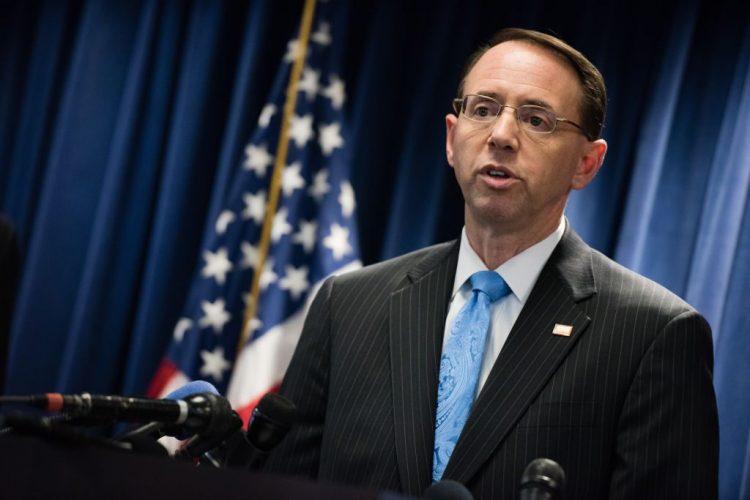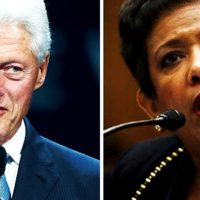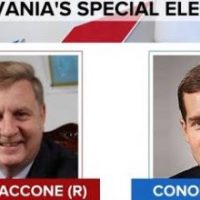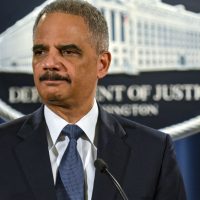WASHINGTON — Deputy Attorney General Rod Rosenstein gave a resume to the Senate Judiciary Committee for his confirmation to be Deputy Attorney General. In that resume, provided under oath, he falsely stated the dates at which he worked for Ken Starr’s investigative legal team.
Rosenstein testified to the Senate that he worked on Starr’s team beginning in 1995 and ending in 1997. Rosenstein said that he began working at the U.S. Attorney’s office in Maryland for the Clinton administration in the year 1997. However, records show that Rosenstein interviewed Hillary Clinton for Ken Starr in the Whitewater case on January 14, 1998.
Rosenstein’s official interview with Hillary Clinton lasted fifteen minutes and cleared her of charges stemming from the seizing of FBI documents on the former Clinton White House travel director.
Big problem: That official interview took place outside of the time period in which Rosenstein told the Senate he worked for Kenneth Starr’s team.
An Associated Press wire report on January 14, 1998 lists Rod Rosenstein as one of two “Whitewater prosecutors” present at Hillary Clinton’s interview on the FBI Travel Office scandal. Rosenstein was in charge of the “FBI Travel Office case,” in which it was alleged that the Bill Clinton White House seized FBI file documents on “former White House employees.” Rosenstein swept the matter under the rug, according to insiders, and then obscured any record of it on his Senate questionnaire to be Deputy Attorney General.
Here’s Rosenstein’s official resume that he gave to the Senate for his confirmation. Notice how he lists his term in Ken Starr’s office as lasting from 1995 to 1997, and how he began his new job in the Clinton administration U.S. Attorney’s office in Maryland in 1997:

Big League Politics has learned that Attorney General Jeff Sessions personally wanted Rosenstein to be his No. 2 at the Department of Justice, and that White House counsel Don McGahn smoothed the matter over with President Donald Trump. Sessions has a relationship with Rosenstein through a well-connected Washington lawyer named Charles Cooper, who is a University of Alabama alum and who represents Sessions in the Russia case. Cooper interviewed Rosenstein when Sessions was considering making Rosenstein his number two, and Cooper signed off on Rosenstein. Cooper saw confidential Iran-Contra documents alongside other Reagan administration officials in a 1986 meeting at Old Ebbit Grill, a restaurant in the nation’s capital.
Rosenstein is also a close personal friend of FBI director Christopher Wray.
Here’s an Associated Press clipping on Rosenstein’s interview with Hillary Clinton on January 14, 1998 (emphasis added):
By Pete Yost
Associated Press Writer
Wednesday, January 14, 1998; 1:29 p.m. EST
Rodham Clinton for 10 minutes today about the White House’s gathering of
FBI background files on hundreds of political appointees from past
Republican administrations.
unaware of how the White House came to hire Craig Livingstone, the
former aide who ran the office that gathered the FBI files.
in the Treaty Room on the second floor of the White House family
residence, where investigators have interviewed the president and first
lady several times in recent years.
White House spokesman Mike McCurry said that “as the president has
previously announced, he and Mrs. Clinton are cooperating fully with the
independent counsel. Mrs. Clinton voluntarily agreed when an interview
was requested.”
McCurry said that the sworn testimony focused on “the acquisition in
1993-94 by the White House of certain FBI file information concerning
former White House employees. Consistent with past practice, no further
statements about the content of the interview will be made at this
time.”
Also present for the questioning of Mrs. Clinton were two of her private
Whitewater lawyers, David Kendall and Paul Gaffney, White House counsel
Charles F.C. Ruff, White House lawyer Sally Paxton, and Whitewater
prosecutors Jackie Bennett and Rod Rosenstein. Bennett is Starr’s deputy
in charge of the Washington office of the Whitewater investigation.
The gathering of the FBI files was discovered by the House Government
Reform and Oversight Committee in 1996, as it delved into the Clinton
White House’s purge of longtime travel office employees. Among the
information the White House gathered: the FBI background file of the
travel office’s director.
Presidential aides then disclosed that an Army detailee at the White
House, Anthony Marceca, had gathered the files of hundreds of former
aides from Republican administrations. The detailee said he was doing so
as part of routine background checks for people whose names were still
on lists of people with White House access.
Marceca’s boss, Livingstone, a campaign advanceman, said he wasn’t aware
of the gathering of the files by his subordinate and resigned.
Republican hearings on the controversy never were able to establish that
the Clinton White House had made any use of the files.
Want more BFT? Leave us a voicemail on our page or follow us on Twitter @BFT_Podcast and Facebook @BluntForceTruthPodcast. We want to hear from you! There’s no better place to get the #BluntForceTruth.







